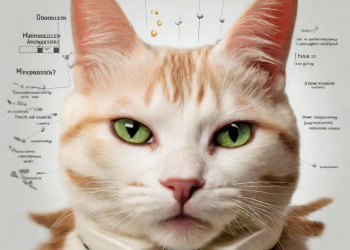Meloxidyl for cats: What is it and how does it work?
After researching and speaking with my veterinarian, I discovered that Meloxidyl is a nonsteroidal anti-inflammatory drug (NSAID) used to treat conditions in cats such as arthritis, chronic pain, and postoperative pain. It works by inhibiting the production of prostaglandins, thereby reducing inflammation and pain in the cat’s body. However, it is important to consult with a veterinarian before administering any medication to your cat.
What is Meloxidyl for cats?
Meloxidyl is a non-steroidal anti-inflammatory drug (NSAID) used in cats to treat pain and inflammation associated with diseases such as osteoarthritis. However, there is more important information you should know about this medication to ensure your cat receives the best possible treatment. Read on to find out everything you need to know about Meloxidyl for cats.
How does Meloxidyl work in cats?
Meloxidyl for cats is a nonsteroidal anti-inflammatory drug (NSAID) that acts similarly to aspirin and ibuprofen in humans. Its main function is to reduce inflammation and relieve pain in cats suffering from conditions such as arthritis or muscle injuries.
Mechanism of action
The active ingredient in Meloxidyl, meloxicam, works by inhibiting the production of chemicals in the cat’s body that cause inflammation and pain. This helps reduce swelling and discomfort in the joints and muscles.
Effects on the cat’s body
Once administered, Meloxidyl is quickly absorbed into the cat’s bloodstream and begins to work within hours. The anti-inflammatory and analgesic effects can last up to 24 hours, providing relief to cats suffering from chronic or acute pain.
Comparison with other similar medications
Compared to other NSAIDs for cats, Meloxidyl stands out for its effectiveness and duration of action. Additionally, its liquid presentation facilitates administration and precise dosing, making it a convenient option for cat owners.
In summary, Meloxidyl for cats is a safe and effective option for the treatment of pain and inflammation in cats, as long as the veterinarian’s instructions are followed and the necessary precautions are taken.
III. When is it recommended to use Meloxidyl in cats?
Meloxidyl for cats is recommended in various medical conditions, offering advantages and disadvantages compared to other treatments. Below are the situations in which its use is recommended:
A. Common medical conditions in cats that can be treated with Meloxidyl
- Arthritis: Meloxidyl is effective in relieving pain and inflammation in cats with arthritis, improving their quality of life.
- Post-operative pain: After surgeries or veterinary procedures, Meloxidyl can help control pain and inflammation in cats.
- Other inflammatory conditions: The medication may also be used to treat other inflammatory conditions in cats, such as musculoskeletal injuries.
B. Advantages and disadvantages of using Meloxidyl compared to other treatments
- Advantages: Meloxidyl is easy to administer, has a long duration of action, and may be more effective than other nonsteroidal anti-inflammatory drugs (NSAIDs) in some cases.
- Disadvantages: Some cats may experience gastrointestinal side effects, and prolonged use may impact kidney function.
C. Dosage recommendations based on the cat’s condition
- The dosage of Meloxidyl for cats varies depending on the medical condition being treated and the individual response of each animal.
- It is important to follow the veterinarian’s instructions regarding the dosage and duration of treatment with Meloxidyl.
In summary, Meloxidyl for cats is an effective option in the treatment of pain and inflammation in various medical conditions, but its use must be supervised by a veterinarian to ensure safety and effectiveness in each case.
How to administer Meloxidyl to a cat?
Dosage instructions
It is important to follow your veterinarian’s instructions when administering Meloxidyl to your cat. The recommended dose may vary depending on the weight and health condition of the animal.
Forms of administration
Meloxidyl is available in liquid form and can be administered orally or by injection, depending on the veterinarian’s preference and the cat’s comfort.
Tips for correct administration
- If given orally, mixing the medication with the cat’s food may help the cat take it more easily.
- If administered by injection, follow the veterinarian’s instructions to ensure safe and effective administration.
How to store medicine properly
It is important to store Meloxidyl in a cool, dry place, away from direct sunlight and out of the reach of children and other pets. Follow the manufacturer’s storage instructions to ensure the medication’s effectiveness.
Remember that before administering Meloxidyl to your cat, it is essential to consult with a veterinarian to obtain specific recommendations for your pet’s case.
Precautions and side effects of Meloxidyl in cats
When giving Meloxidyl to cats, it is important to take certain precautions and be aware of the possible side effects the medication may cause. Below are some important points to consider:
Possible allergic reactions
As with any medication, cats can develop allergic reactions to Meloxidyl. It is important to watch for any signs of allergy, such as itching, redness, or swelling, and seek veterinary care if these symptoms occur.
Interactions with other medications
It is crucial to inform the veterinarian about any other medications the cat is taking, as Meloxidyl can interact with certain drugs and cause unwanted effects. Administration of Meloxidyl together with other non-steroidal anti-inflammatory drugs or corticosteroids should be avoided.
Common side effects and how to manage them
Some common side effects of Meloxidyl in cats include upset stomach, vomiting, and diarrhea. If your cat experiences any of these symptoms, it is important to consult with a veterinarian to determine the best way to manage them.
What to do in case of overdose
In the event of a possible overdose of Meloxidyl, it is essential to seek veterinary attention immediately. Signs of overdose may include lethargy, lack of appetite, and gastrointestinal problems.
It is important to remember that the safety of Meloxidyl in cats may vary depending on the individual health condition of each animal. Therefore, it is always recommended to consult with a veterinarian before administering any medication, including Meloxidyl, to your cat.
SAW. Is it safe to use Meloxidyl on cats?
The use of Meloxidyl in cats has been extensively studied to ensure its safety and effectiveness in treating various conditions. Here are some things to consider:
A. Safety studies and tests
Clinical studies have shown that Meloxidyl is safe for use in cats, as long as the veterinarian’s instructions are followed and the recommended doses are respected. Side effects are minimal and generally well tolerated by felines.
B. Experiences of other cat owners
The experience of other cat owners who have used Meloxidyl is mostly positive. Many have observed a significant improvement in the health and well-being of their pets after starting treatment with this medication.
C. Veterinary recommendations
Veterinarians often recommend Meloxidyl as a safe and effective option for managing pain and inflammation in cats. However, it is important to follow the instructions of the animal health professional to ensure the safety and well-being of the feline.
In summary, the use of Meloxidyl in cats is safe and beneficial when administered properly and under the supervision of a veterinarian. It is always advisable to consult with a professional before starting any treatment with this medication. Your cat’s safety and well-being is a priority, and a responsible approach is essential to ensure its long-term health.
Alternatives to Meloxidyl to treat conditions in cats
Other anti-inflammatory medications for cats
If you are looking for alternatives to Meloxidyl to treat conditions in cats, there are other anti-inflammatory medications that may be considered. Some of them include:
- Metacam
- Rimadyl
- Deramaxx
Alternative therapies
In addition to anti-inflammatory medications, there are also alternative therapies that can help treat conditions in cats, such as:
- Acupuncture
- Chiropractic
- Physiotherapy
Diet and lifestyle changes
Making changes to your cat’s diet and lifestyle can also be beneficial in treating certain conditions. Some recommendations include:
- Feeding foods rich in omega-3 fatty acids
- Control the cat’s body weight to reduce pressure on the joints
- Provide a calm and comfortable environment to reduce stress
Remember that before opting for any of these alternatives, it is important to consult with a veterinarian to determine which is the best option for your cat’s specific condition. It is essential to consider the safety and effectiveness of any treatment, including the use of Meloxidyl in cats.
Frequently Asked Questions about Meloxidyl for Cats
A. Can I give Meloxidyl to my cat without a prescription?
No, Meloxidyl is a prescription medication that must be administered by a veterinarian. It should not be given to cats without the supervision of an animal health professional.
B. How long does it take for the medication to work?
The time it takes for Meloxidyl to take effect in cats can vary, but improvements in symptoms are generally seen within the first 24 hours of administration.
C. Can I use Meloxidyl on older cats or cats with pre-existing health problems?
It is important to consult with a veterinarian before giving Meloxidyl to older cats or cats with pre-existing health problems, as there may be additional risks associated with its use in these situations.
D. Can I use Meloxidyl on pregnant or lactating cats?
The use of Meloxidyl in pregnant or lactating cats is not recommended, as it may have negative effects on the health of the mother and kittens. Always consult a veterinarian before administering any medication to a cat in these conditions.
En resumen, Meloxidyl es un medicamento recetado que debe ser administrado por un veterinario, y no se recomienda su uso en gatos sin supervisión médica. Siempre consulte con un profesional de la salud animal antes de administrar Meloxidyl a su gato, especialmente si es mayor, tiene problemas de salud preexistentes, o es una gata embarazada o lactante.
Experiencias de dueños de gatos con Meloxidyl
El uso de Meloxidyl en gatos ha sido una opción efectiva para muchos dueños de mascotas. A continuación, algunas experiencias compartidas por otros propietarios de gatos:
A. Historias de éxito
Algunos dueños de gatos han notado una mejora significativa en la movilidad y comodidad de sus mascotas después de comenzar a usar Meloxidyl. Los gatos con artritis o dolor crónico parecen experimentar alivio y una mejor calidad de vida.
B. Problemas o dificultades encontradas
Algunos propietarios han mencionado que sus gatos pueden ser reacios a tomar el medicamento, especialmente si se administra en forma líquida. También se han reportado casos de efectos secundarios leves, como vómitos o diarrea, aunque estos síntomas suelen desaparecer con el tiempo.
C. Consejos y recomendaciones de otros dueños de gatos
- Si tu gato se muestra renuente a tomar Meloxidyl, intenta mezclarlo con su comida favorita para hacerlo más atractivo.
- Observa de cerca a tu gato al comenzar el tratamiento con Meloxidyl y comunica cualquier cambio o preocupación a tu veterinario.
- Algunos dueños han optado por alternativas naturales, como suplementos de glucosamina, en lugar de medicamentos antiinflamatorios como Meloxidyl.
Es importante recordar que cada gato es único y puede reaccionar de manera diferente al tratamiento con Meloxidyl. Siempre consulta con un veterinario antes de iniciar cualquier medicación para tu gato.
Conclusión
En resumen, Meloxidyl es un medicamento antiinflamatorio no esteroideo que se utiliza comúnmente en gatos para tratar el dolor y la inflamación asociados con diversas condiciones médicas. Es importante destacar que, si bien Meloxidyl puede ser beneficioso para los gatos en ciertas situaciones, su uso debe ser supervisado por un veterinario para garantizar la seguridad y eficacia del tratamiento.
Recomendación final sobre el uso de Meloxidyl en gatos
Si tu gato requiere tratamiento para el dolor o la inflamación, es fundamental consultar con un veterinario antes de administrarle Meloxidyl. El profesional podrá evaluar la condición de tu mascota y determinar si este medicamento es la opción más adecuada. Además, el veterinario podrá proporcionar instrucciones precisas sobre la dosificación y la administración de Meloxidyl, así como monitorear la respuesta de tu gato al tratamiento.
Importancia de consultar con un veterinario antes de administrar cualquier medicamento a tu gato
Your cat’s health and well-being is a priority, so it is crucial to seek professional guidance before administering any medication, including Meloxidyl. A veterinarian will be able to provide you with specific information about the benefits and risks of this medication, as well as personalized recommendations for your pet’s care.











